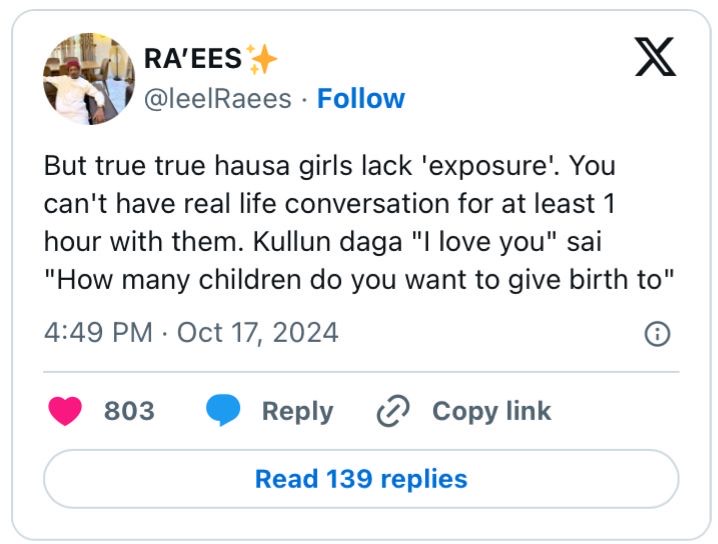In Nigeria, stereotypes don’t just live in jokes and social media banter, they shape how people see and treat women. Many of these harmful ideas are tied to ethnic identities, meaning that a Yoruba woman, an Igbo woman, a Hausa woman, or an Akwa Ibom woman can walk into a room already carrying labels she didn’t choose for herself.
The sad part is that these myths are so popular they’ve become cultural shorthand, recycled in music, Nollywood, gossip, and casual conversations.
But where do they actually come from, and why do they stick so stubbornly? Let’s break down some of the most common ones.
Yoruba Women
If there is any ethnic group of women that carries the heaviest weight of stereotypes, it is Yoruba women. Some of the most repeated ones include:
“Yoruba women bleach their skin.”
This stereotype links Yoruba women with skin-lightening practices, partly because of Lagos and Ibadan’s long history as urban, fashion-forward hubs where cosmetic trends spread quickly. The reality is that women from all backgrounds use bleaching creams, but Yoruba women have been unfairly singled out as poster figures for it.
“They are not beautiful/they are ugly.”
This idea reflects a long history of tribal rivalry and cultural bias. Labelling Yoruba women “ugly” has been less about reality and more about reinforcing negative perceptions to elevate women from other ethnic groups.
“They are dirty.”
This stereotype, often circulated in jokes about hygiene, probably stems from historical urban overcrowding in Yoruba-dominated cities. Yet it unfairly reduces individuals to conditions of environment rather than personal character.
Igbo Women
The myths surrounding Igbo women are different, often linked to money, power, and masculinity.
“They are wicked.”
This myth comes from the perception of Igbo women as strong-willed and independent, which in a patriarchal culture often translates into being called “wicked.” The stereotype also grows out of inter-ethnic rivalries where toughness is reframed negatively.
“They like money.”
This is perhaps the most enduring stereotype of Igbo women. It stems from the Igbo people’s deep-rooted entrepreneurial culture, where success and wealth are highly valued. Unfortunately, women caught in this same value system are painted as materialistic or transactional in relationships.
“They are shameless.”
Because Igbo women are often unapologetic about ambition, confidence, or sexual agency, society brands them “shameless.” This reflects discomfort with women who don’t conform to modesty standards, especially in public spaces.
Hausa Women
For Hausa women, the stereotypes reflect a mixture of religion, cultural conservatism, and socioeconomic realities of the North.
“They are low maintenance.”
This stereotype presents Hausa women as simple, easy to please, and less demanding, compared to their southern counterparts. It is rooted in cultural norms of modesty, but it also patronises Hausa women, reducing their individuality to a flat caricature.
“They are cheap.”
Tied to the idea of being “low maintenance,” Hausa women are stereotyped as less financially demanding in relationships. This myth ignores the reality of structural poverty and misrepresents humility as cheapness.
“They are not very educated.”
This stereotype arises from lower female literacy rates in the North, driven largely by systemic barriers such as early marriage, poverty, and cultural restrictions. Instead of seeing these as structural issues, society labels Hausa women themselves as “uneducated.”
“They are humble.”
Humility is seen as a default trait of Hausa women, connected to Islamic ideals of modesty. While humility can be positive, the stereotype can be weaponised to enforce silence and passivity, denying women space to be outspoken.
Why these stereotypes stick
Ethnic stereotypes about Nigerian women are fueled by a mix of history, rivalry, and patriarchy. They are repeated because they are convenient, easy narratives that reduce the complexities of millions of women into a single joke or insult. They are also reinforced by Nollywood scripts, music lyrics, and even comedy skits that recycle these tropes for laughs.
The real danger is how much they influence real life. A Yoruba woman may be unfairly judged as “diabolical” when she’s just confident. An Igbo woman negotiating higher pay might be dismissed as “greedy.” A Hausa woman asserting herself could be told she’s “supposed to be humble.”
More than myths
To challenge these narratives, we have to first admit they exist. And then ask why we keep repeating them. Nigerian women are not a monolith; they are diverse in personality, ambition, beauty, and choices. Reducing them to bleaching creams, money, or wombs only blinds us to their reality.






